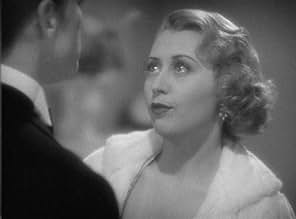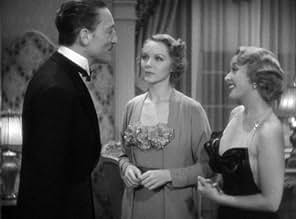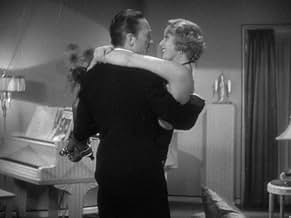Vicki Wallace provoca a su esposo Tony hasta que él la golpea. Tras divorciarse y casarse con Vernon, su conducta causa problemas similares. Regresa a casa de Tony, donde surge un drama con ... Leer todoVicki Wallace provoca a su esposo Tony hasta que él la golpea. Tras divorciarse y casarse con Vernon, su conducta causa problemas similares. Regresa a casa de Tony, donde surge un drama con Bonnie, la cita de Tony, y los amigos de Vernon.Vicki Wallace provoca a su esposo Tony hasta que él la golpea. Tras divorciarse y casarse con Vernon, su conducta causa problemas similares. Regresa a casa de Tony, donde surge un drama con Bonnie, la cita de Tony, y los amigos de Vernon.
- Dirección
- Guionistas
- Elenco
- Model
- (sin créditos)
- Judge
- (sin créditos)
- Duryla Model
- (sin créditos)
- Court Spectator
- (sin créditos)
- Court Recorder
- (sin créditos)
- Mrs. Crosby's Mother
- (sin créditos)
- Nightclub Patron
- (sin créditos)
- Model
- (sin créditos)
- Court Clerk
- (sin créditos)
- Nightclub Patron
- (sin créditos)
Opiniones destacadas
Johnny on the spot lawyer and neighbor Edward Everett Horton offers to be Blondell's divorce attorney and he marries her. But we're talking life with Horton and his fuss budget personality.
I think you can figure this one out. It's most dated because in this day and age no one slaps a woman without condemnation.
Still F. Hugh Herbert's script has quite a few laughs in it and Warner Brothers regulars Claire Dodd and Frank McHugh get their share also as neighbors and card playing regulars.
Funny at times, but most dated.
This very bizarre little comedy from Warner Bros., which sneaked in under the wire before the imposition of the Production Code, actually espouses physical abuse as the secret ingredient needed in keeping the romantic spark alive in marriage. This distressful assertion is promoted by skillful players and smug dialogue, but to no avail.
Joan Blondell, as blonde & curvaceous as ever, is portrayed as an intensely annoying young virago with all the charm of an acid bath. Endlessly nagging, the script gives her one shrill note to play, which she does with unnerving tenacity. In most of her other roles of the period she played a smart & sassy gal who has to fight her way to happiness by final fadeout. Here, Blondell starts with everything and seems determined to claw her way to the bottom again. Must be some sort of mental aberration.
Patrician Warren William & nervous Edward Everett Horton supplied wonderful moments in dozens of Golden Age films. Here, as the two men caught in Blondell's web, although they make valiant efforts, they seem out of place in the rather sordid storyline.
Rounding out the cast as two friends seemingly without meaningful lives of their own, viewers will probably find Frank McHugh to be distressingly simpleminded and pretty Claire Dodd vindictive & catty. Neither exemplify the sort of friend one would want to have during a time of domestic crisis.
Perhaps it would be well to quote a single paragraph from celebrated journalist Harriet Hubbard Ayer's essay `What Not To Do,' published in CORRECT SOCIAL USAGE (The New York Society Of Self-Culture, 1903) `Don't nag; there's nothing in it but hateful thoughts for all concerned, and such thoughts are germs that breed deceit on one side and ungovernable temper on the other. At the end of the road is division of hearts, often a divorce court.' Blondell & Company should have paid heed.
He does, and fast forward and Vicki has married Vernon. But the grass is not greener. Vicki finds herself bored with Vernon's kind and giving ways and decides she wants her first husband back. Complications ensue.
It really pains me to give a movie with the best WB had to offer in comedy in front of the camera in 1934 only a mediocre grade. But the characters are cardboard and the very thin humor wore on me after a very short while. And Blondell is playing one of the most annoying nagging characters in the history of film, although she is playing it tongue in cheek. How I felt about this film was very similar to how I felt about the very first production code comedies because they often substituted shouting and motion for that great precode bite and energy.
Apart from Frank McHugh's comedy relief character, none of the other characters are that likeable - they're not black and white but a lot more multi dimensional than is typical from films of this era. Even Joan Blondell is horrible whilst at the same time being utterly desirable and makes her character completely believable as someone who can manipulate these weak men, well to be honest, all men.
In typical 1930s penny-pinching WB style, this was all put together in just three weeks with people working 14 hour days. Joan was having her own serious marriage problems at the time and was so over-worked that she collapsed from mental exhaustion shortly after this was finished. Despite this and the perceived light-hearted approach to violence towards women - which is a little uncomfortable to watch (but when viewed in the context of these damaged characters makes sense), Smarty is still fun to watch and Joan somehow manages to look amazing and be convincing.
Considering it's a rush-job, it's reasonably well directed although a bit stagey at times and well acted even by WE and EEH who are out of their usual comfort zones. Overall - an enjoyable fun picture that's also a lot deeper and more thought provoking than you'd expect.
Joan Blondell, infamous for her proclivity for shedding her clothes at parties, seems right at home in this role. Her risqué comments and coy delivery fit neatly within the framework of her character.
You could not make this movie today. Even the thought of a woman inviting physical abuse upon herself is taboo. But not in "Smarty". This brisk, if somewhat slight, film bathes in its taboo-breaking with a kind of so what bravado. The characters are friendly, even affectionate, with each other despite the blows, both physical and emotional. The breezy repartee ignores the reality of the situations, instead playing light thanks to a humorous script and crisp performances.
Yes, "Smarty" is a look back at a time before PC was de riguer and people like Will H. Hays, for better or worse, ruled cinema. If you can get past the glossing over of physical violence, you may just be lured into the lead character's web. Joan Blondell brings it. Watching her performance in this movie, I don't know why she wasn't a bigger star.
¿Sabías que…?
- TriviaTony tells Vicki that he's been going to the movies quite a lot recently, and there the women are quite different: "They get pushed in the face with grapefruit and they love it." This is a reference to El enemigo público (1931) with James Cagney, who famously shoved half a grapefruit into Mae Clarke's face. Joan Blondell also was in that film, so this apparently is an inside joke.
- ErroresAt the 4 minute mark the boom mic shadow moves on the wall by the book shelves.
- Citas
George Lancaster: Love is the illusion that one woman differs from another.
- ConexionesReferences El enemigo público (1931)
- Bandas sonorasBridal Chorus
(1850) (uncredited)
from "Lohengrin"
aka "Here Comes the Bride"
Music by Richard Wagner
Performed by the Vitaphone Orchestra
Variation played when marriage is announced in gossip column
Selecciones populares
Detalles
- Tiempo de ejecución1 hora 5 minutos
- Color
- Mezcla de sonido
- Relación de aspecto
- 1.37 : 1
Contribuir a esta página





































